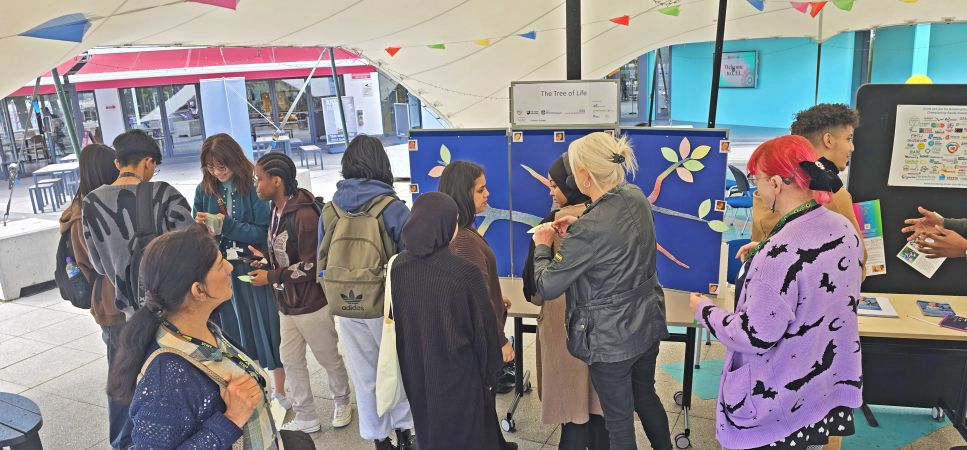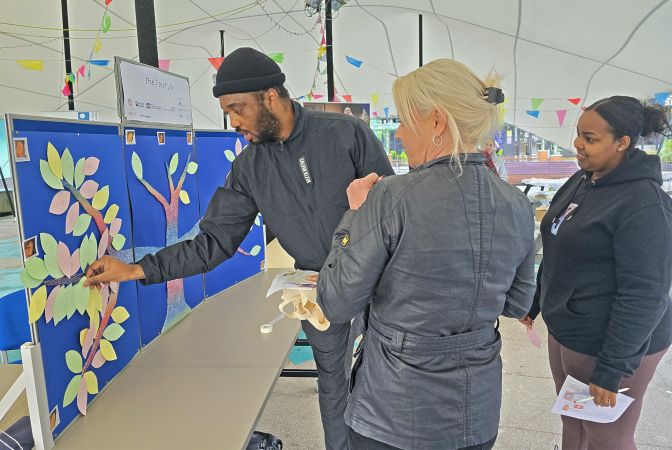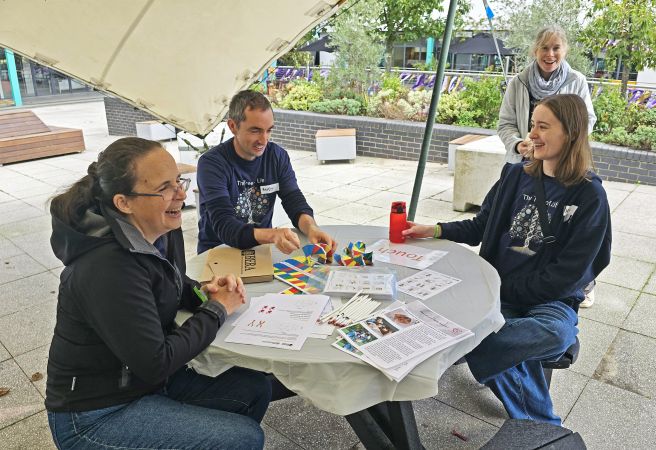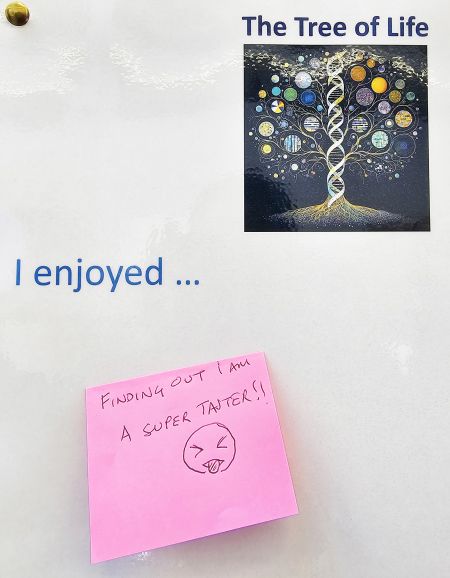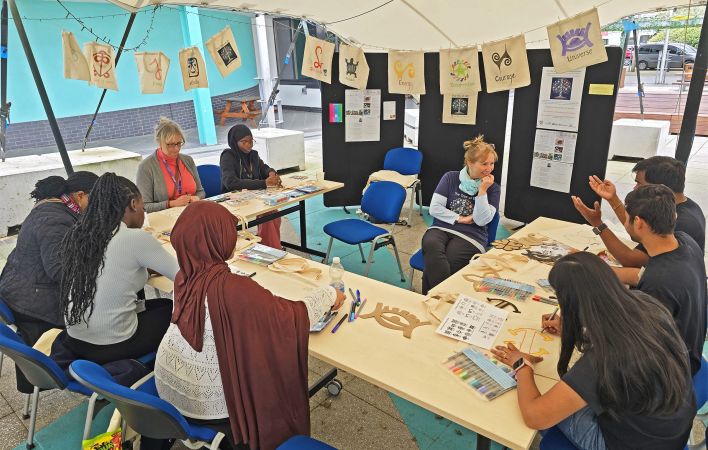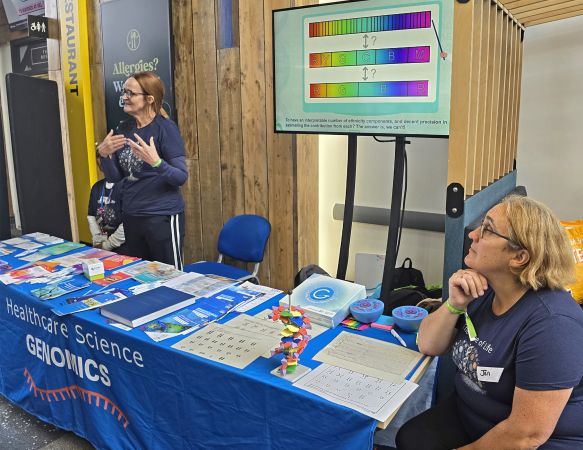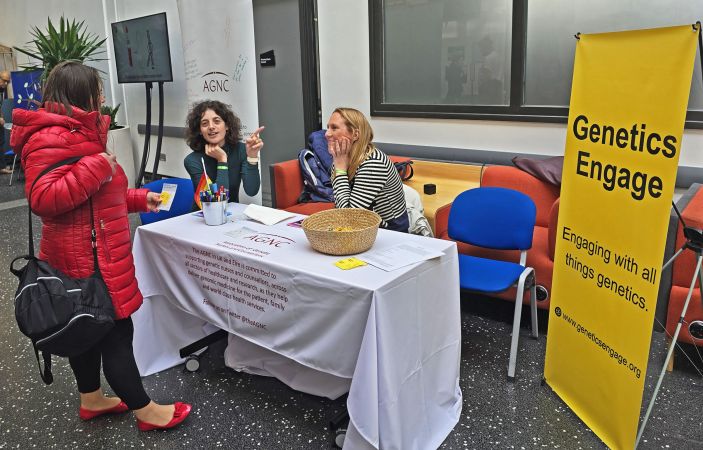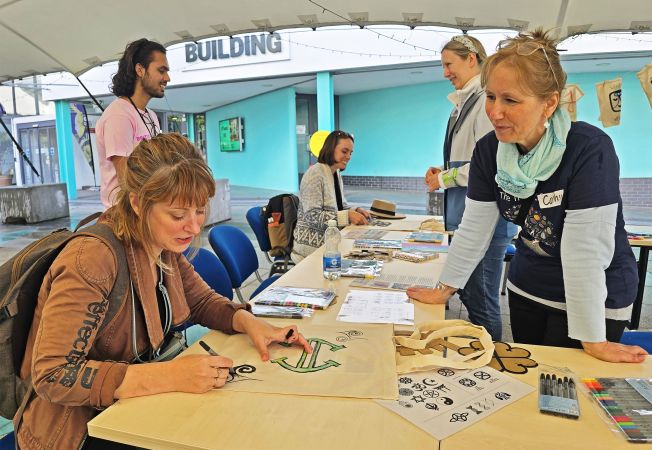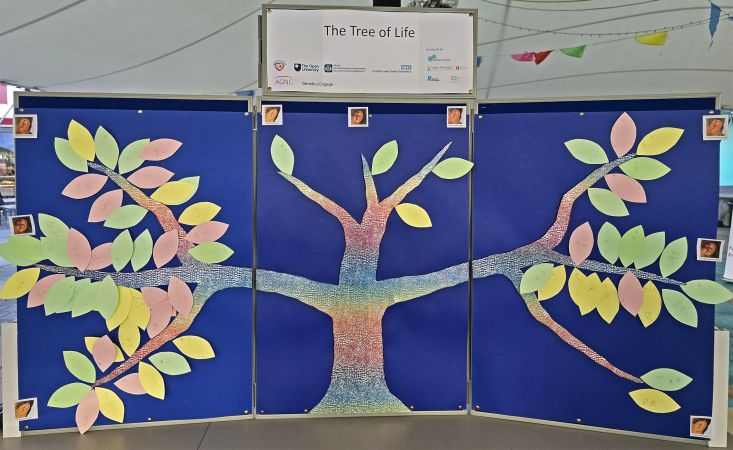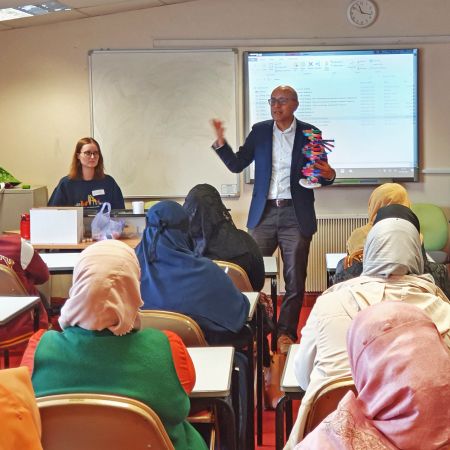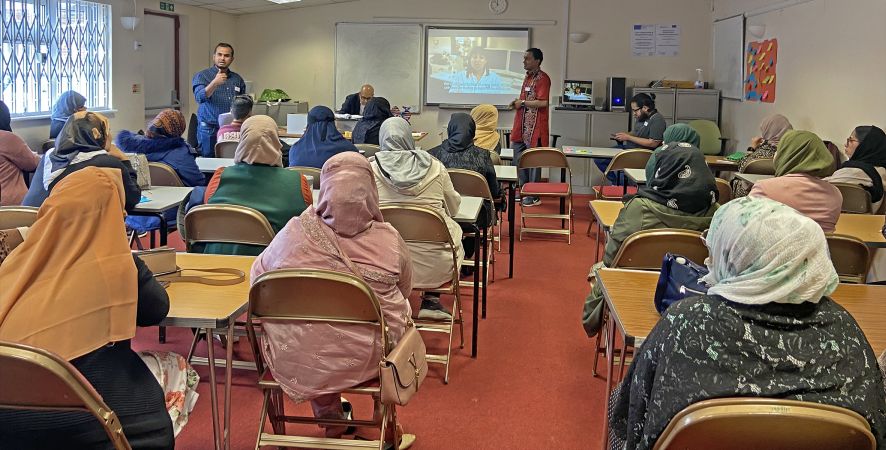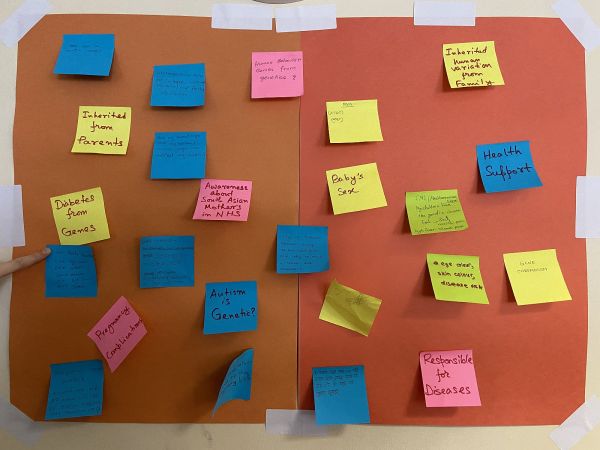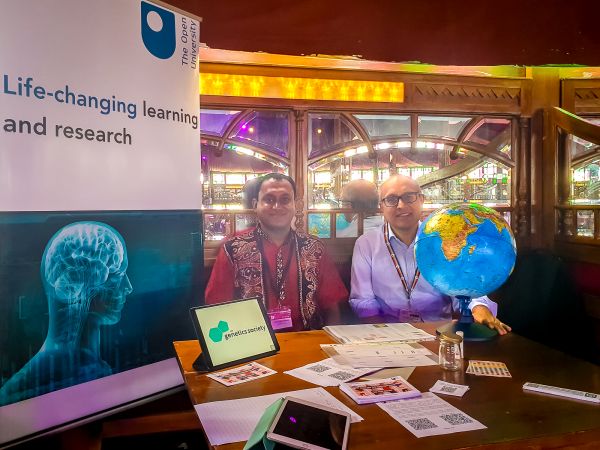GRACE
Genetics Research Awareness via Community Engagement
You are here
- Home
- News
News
British Science Festival in London
In September, we ran a day-long, drop-in event, ‘The Tree of Life’, as part of the British Science Festival held at the University of East London’s Docklands campus. The event was a collaboration between the GRACE project, the charity Breaking Down Barriers (BDB), NHS Central and South Genomic Medicine Service Alliance (CAS GMSA), and members of the Association of Genetic Nurses and Counsellors (AGNC).
The British Science Festival provides a platform to celebrate science and innovation through a programme of engaging talks, workshops, and activities. Within this, the Tree of Life event aimed to spark conversations with members of the public about genetics, help visitors to find connections between genetics and their own lives, and raise awareness about the types of genetic services available, linked with discussions about representation and diversity.
Members of GRACE project and BDB based in the Stretch Tent encouraged visitors to represent themselves on the flourishing tree of life – a growing artwork combining themes of diversity, genetics, and identity. This activity presented three simple manifestations of genetic variation to reflect the diversity and similarities between us: (1) which thumb dominates when clasping the hands, (2) taste sensitivity to the substance PTC, (3) and earlobe attachment. Visitors tested their own traits and engaged in discussions about the genetics and inheritance of these. The PTC activity was particularly popular, especially when ‘supertasters’ (those who taste PTC as very bitter) and non-tasters for PTC observed each other’s simultaneous opposite reactions. The expression of each trait was divided into three categories, with an intermediate presentation between two extremes (i.e. left thumb dominance, right thumb dominance, both left and right/no preference) to highlight the non-binary nature of human variation. Based on their combinations of these traits, visitors placed their colour-coded leaf on a specific branch of the Tree of Life. Some branches had many leaves, while others had just one or two. This fed into discussions about the use of trees to describe diversity, genetic variation, and for modelling in mathematical sciences.
Visitors related to each other were often surprised to find that they had very different reactions to PTC. In some cases, a parent was a PTC supertaster while their child could not taste PTC at all, showing that the genetic change responsible for PTC tasting ability had not been passed on. This activity demonstrated the unseen genetic variation within families and how this even extends to our tastes, suggesting that family members eating the same meal will all likely have slightly different taste experiences.
Many visitors who took part in the thumb dominance activity relayed that it was something they had never thought about before, and certainly not in terms of its connection with genetics. Reflections on this led to discussions about how our genetics shapes us in many ways that we may overlook.
Alongside the Tree of Life, BDB ran an arts and crafts workshop in which visitors designed their own tote bag artwork with meaningful symbols representing various characteristics, identity, and family. This workshop used art and creative expression to facilitate small-group open conversations about genetics, inheritance, and health, uncover the important role genetics has on our lives, and make these complex ideas more accessible. This was an important learning experience, as those who attended the workshop explored the necessity of engaging with genetics and those who ran the workshop learned more about the barriers and drivers that affect peoples’ participation in genetics research and services.
Visitors fed back that they found the activity inclusive, and many were keen to engage in conversations about health-sector barriers. Visitors also shared stories about their own health care journeys as well as general frustrations around healthcare, such as difficulties getting GP appointments.
A local science teacher contributed to the conversation around barriers to health and health services. She highlighted how difficult it is to get a GP appointment and questioned whether GPs would have knowledge of genetics and referral pathways. When shown the BDB Family Tree activity, she requested a batch of worksheets to show her class and said, ‘This is a great idea. We should be doing this in schools.’
Additional activities were run in the Stretch Tent for visitors who wanted to learn more genetics. These included investigating the structure of DNA by constructing an origami helix and exploring examples of genetic variation associated with our senses, such as optical illusions and colour blindness. The nature of this workshop meant that visitors engaged with various interconnected activities to and could dip in and out depending on their interests and comfort level.
As a collaborative event, representatives from NHS CAS GMSA and the AGCN ran tables to engage visitors in the East Building walkway. The NHS CAS GMSA table hosted a variety of fun activities to introduce genetics to a beginner audience, including activities to decipher the genetic code and simulate genetic testing techniques using a pipette. This was paired with resources and discussions with NHS genomic staff about different genetic conditions, available NHS genomic services, and some of the cutting-edge genomic medicine technologies being introduced in healthcare.
At the AGCN table, visitors talked with genetic counsellors about their role in healthcare. Prompted by thought-provoking discussion points, visitors shared their own perspectives, questions, and concerns about genetics and genetic counselling, including ethical dilemmas in these fields. Some visitors took part in recorded discussions for the initiative, Genetics Engage, about their perceptions, hopes, concerns, and barriers relating to genetics and accessing genetic services.
Overall, the event was successful in addressing its aims. Despite the weather limiting visitor numbers, we had many interesting conversations about genetics, inheritance, and available NHS services with those who attended. Visitors from all backgrounds were curious to discover the influence that genetics has on their characteristics and, in turn, shared their valuable perspectives about genetics with us. By engaging enthusiastically with this event, visitors became more familiar with core genetic concepts and learned about the genetic services available to them on the NHS – both key factors in promoting participation of underrepresented groups in genetics research and services. Those involved in the arts and crafts workshop took home their personalised bag to remind them of their discussions and hopefully used this to spark new conversations about genetics with their families and friends.
We look forward to connecting a wider audience with genetics through the Tree of Life in future events and to continue our partnerships with BDB, CAS GMSA, and the AGCN. Thanks to Genetics Society for providing the public engagement funding to make this event possible, and thanks to EPSRC for providing an internship funding.
Community Workshop in Luton
In September, we ran a genetics workshop at CYCD, and adult education centre in Luton providing free English language courses to recent immigrant families of socioeconomically underprivileged backgrounds. Around 60 people, nearly all women of South Asian heritage, attended the event.
The session began with discussions about what the word ‘genetics’ meant to those in the group, who enthusiastically shared their thoughts. Many were able to relate genetics to areas of their lives, such as certain health conditions. Some attendees had heard about health risks from consanguineous marriages and wanted to understand more. The session was run in a mixture of English, Bengali, Urdu, and Hindi, so everyone had a voice in the discussion.
We then showed our videos as an introduction to the project, genetics, and genetic testing. The group also had a chance to try the fun PTC tasting activity, which went down well and was a great way for them to see hands-on some of the topics we had discussed.
As the session ended, we invited the group to fill out our survey to help us further understand their views on genetic testing and how it could be more accessible. Throughout the session, many attendees shared their thoughts and experiences, including difficulties accessing health services for language barriers, and raised questions about how genetic testing could meet the needs of their community. This shows how much progress needs to be made, as barriers to accessing basic healthcare makes participation in genetics research almost impossible for these ‘hard to reach’ communities.
The session raised questions of what is means to be representative, and acknowledging that no ethnicity is a monolith – while research studies may fill their numbers of ethnic minority participants by recruiting higher educated or economically stable volunteers, those from socioeconomically deprived groups are often excluded by challenges with information, language, or trust, unless focused outreach is undertaken. This principle is the heart of the GRACE project, as it is only by working in partnership with underrepresented communities that we can tackle inequalities towards better representation in genetics research.
Milton Keynes International Festival: Cabaret of Ideas
In July, we participated in the festival event, which invited members of the public to learn more about impactful research.
We talked about the importance of diversity in genetics research. Visitors were invited to label their places of origin on a globe, which sparked conversations around origin, heritage, and genetics. Many attendees shared their experiences of medical genetic testing, or being close to someone who had, which made the conversations more meaningful.
We then used PTC tasting strips as a fun demonstration of how variations in our genetic code affects our characteristics like taste, and how these traits can evolve through natural selection. In some cases, members of the same family had very different sensitivities to PTC, which attendees found amusing, and fed into conversations about natural genetic variation, including varying disease risk within families.
The event was useful in starting conversations about genetics research and its implications, but also for us to learn about the diversity and curiosity in the local community from their shared experiences.
Help us by completing our survey!
We are currently conducting some research on attitudes towards genetic testing, via a short 3-5 minute survey.
We welcome anyone who would like to take part.
